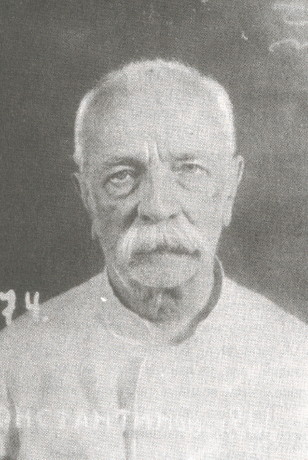Tymchenko, Yevhen
Tymchenko, Yevhen [Тимченко, Євген; Tymčenko, Jevhen], b 8 November 1866 in Poltava, d 22 May 1948 in Kyiv. Linguist, translator and lexicographer; member of the Shevchenko Scientific Society and the Ukrainian Scientific Society in Kyiv, and corresponding member of the USSR Academy of Sciences from 1929. While working in a lands office in Kyiv (1891–2), the zemstvo administration in Chernihiv (1893–8), and the library of Kyiv University (1898–1908), he belonged to the Brotherhood of Taras and was active in the Kyiv Prosvita society. After completing his studies at Kyiv (1909–12) and Saint Petersburg (MA, 1914) universities, he taught at Warsaw University (1914–16) and Don University in Rostov-na-Donu (1916–18). In 1918 he was appointed a member of the Codification Commission under the Ukrainian National Republic Ministry of Justice. While he was a professor of the Ukrainian language and linguistics at Kyiv University (1918–20) and the Kyiv Institute of People's Education (1920–32), he also headed the VUAN Permanent Commission for the Compilation of the Historical Dictionary of the Ukrainian Language. From 1932 he was persecuted by the Soviet regime, and in 1939 he was imprisoned. Exiled to Krasnoiarsk, Siberia, in 1941, he was released in 1944 and worked at the Institute of Linguistics of the Academy of Sciences of the Ukrainian SSR until his death.
Tymchenko's major works are a Russian-Ukrainian (‘Little Russian’) dictionary (2 vols, 1897, 1899); a scholarly Ukrainian grammar (1907, 1917, 1918) and a secondary-school grammar textbook (1918); a book-length program for the collection of Ukrainian dialectal particularities (with Kostiantyn Mykhalchuk, 1910); a booklet of instructions on how to record Ukrainian dialectal materials (1925); a course book on the history of the Ukrainian language (1927; 2nd edn 1930); and monographs on the genitive case in the South Russian linguistic province (1913), and the Ukrainian locative (1924), nominative and dative (1925), vocative and instrumental (1926), and accusative (1928) cases. After 1932 only his article on a dialectal trait of the use of the morpheme sja (1948) was published.
In his approach to modern literary Ukrainian (see Standard Ukrainian), Tymchenko was the most typical representative of the archaizing ethnographic school, whose members propagated the notion of the independent development of the Ukrainian language on the basis of selectively chosen dialectal features. In studying the history of Ukrainian, he applied a neogrammarian approach. In an article on Slavic unity and the position of Ukrainian in the Slavic family (Ukraïna, 1924, no. 3) he came out against the hypothesis of a proto–East Slavic language.
From 1894 to 1898 Tymchenko worked on the preparation of a Ukrainian-Russian dictionary (see Lexicography). Prepared in a Russian orthography, it was later converted to the Ukrainian orthography, augmented, and published by Borys Hrinchenko (4 vols, 1907–9). From 1901 Tymchenko collected materials for a historical dictionary of 14th- to 18th-century Ukrainian. Its prototype was to be published (but was not) as an appendix to Hrinchenko's. The first two fascicles of a vastly expanded version of the historical dictionary (A–Zh), prepared in collaboration with E. Voloshyn, Kateryna Lazarevska, and H. Petrenko, were finally published in Kyiv in 1930 and 1932 (repr, Munich 1985). The Stalinist suppression of Ukrainian culture permanently interrupted work on the dictionary, and a subsequent fascicle was destroyed at the imprimery. The dictionary's huge file (approx 313,000 cards) is preserved at the Institute of Linguistics of the National Academy of Sciences of Ukraine. Tymchenko translated into Ukrainian the Finnish national epic Kalevala (1901; rev edn 1928); parts of the Estonian epic Kalevipoeg; and stories by Guy de Maupassant, Maurice Maeterlinck, and Victor Hugo.
Roman Senkus
[This article originally appeared in the Encyclopedia of Ukraine, vol. 5 (1993).]

.jpg)